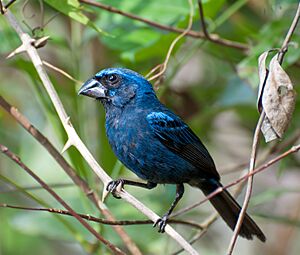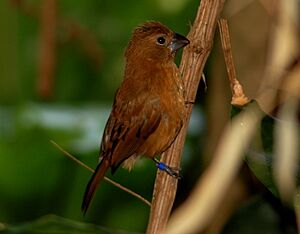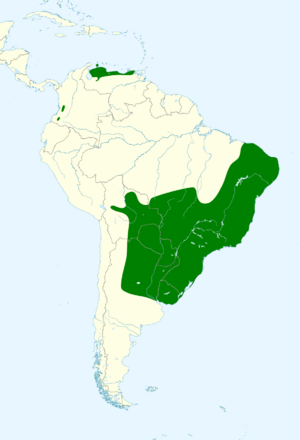Ultramarine grosbeak facts for kids
Quick facts for kids Ultramarine grosbeak |
|
|---|---|
 |
|
| Male in Registro, São Paulo, Brazil | |
 |
|
| female | |
| Conservation status | |
| Scientific classification | |
| Genus: |
Cyanoloxia
|
| Species: |
brissonii
|
 |
|
| Synonyms | |
|
Passerina brissonii (protonym) |
|
The ultramarine grosbeak (scientific name: Cyanoloxia brissonii) is a beautiful bird that belongs to the Cardinalidae family, which also includes cardinals. These birds are found in many different places across South America. They live in areas that are partly open, like the edges of forests. Sometimes, you might find them in two separate areas that are far apart, which is called a disjunct population.
Contents
What Does the Ultramarine Grosbeak Look Like?
These birds are about 15 centimeters (about 6 inches) long. That's roughly the length of a pencil!
- Males: Adult male ultramarine grosbeaks are a stunning dark blue color. Their upper wings are an even brighter blue, almost glowing.
- Females and Young Birds: Females and young birds look quite different. They are mostly brown, which helps them blend in with their surroundings.
Ultramarine grosbeaks are very protective of their space. They are known as territorial birds. This means they like to have their own area and don't usually fly around in large groups or flocks. If another male bird tries to enter their territory, they might have a small fight to protect their home.
Where Do Ultramarine Grosbeaks Live?
These birds like to live in places that have a mix of trees and open spaces. You can often find them in:
- The edges of swamps
- Younger forests that are growing back (called secondary forests)
- Plantations, which are areas where crops or trees are grown
Their main home stretches across Northeast and central Brazil, Bolivia, Paraguay, and Argentina. You can also find some populations further north in Venezuela and Colombia. Birds from different regions might look a little different from each other.
Ultramarine Grosbeak Life Cycle and Habits
How Ultramarine Grosbeaks Reproduce
Ultramarine grosbeaks usually start having their babies between September and February.
- Nests: They build their nests close to the ground, often hidden in bushes or low trees.
- Eggs: A female bird usually lays 2 or 3 eggs at a time.
- Chicks: The baby birds, called chicks, hatch from their eggs about 13 to 15 days later.
What Ultramarine Grosbeaks Eat
These birds have a varied diet. They enjoy eating:
- Seeds
- Fruits
- Insects


